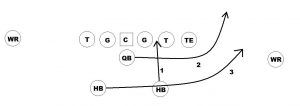In 2010, the NFL debuted its new “modified sudden-death” overtime rule for that year’s playoffs. The rule change set the stage for another miracle for Tim Tebow in Denver, breaking Pittsburgh hearts after hitting Demaryius Thomas for an 80 yard touchdown on the first play. The idea behind the rule change was that a great quarterback like Tom Brady or Peyton Manning wouldn’t be stuck powerless just because his team lost the coin toss. If the team that received the kickoff scored a touchdown, the game is over. If not, the other team gets a chance to score themselves and the game proceeds as sudden death beyond that. In 2012, the NFL owners voted to make the change for regular season games as well. This Sunday, that rule change resulted in a 6-6 tie between the Seattle Seahawks and Arizona Cardinals.
One of the best rivalries in the NFL today was reduced to a contest of futility. Arizona struggled to score, while Seattle failed to create any offense of note until overtime. The only reason Seattle even scored a field goal in regulation was because they managed to block a punt Ryan Quigley late in the fourth quarter in a 3-0 game. Linebacker Bobby Wagner leaped over the Cardinals’ long snapper (a play that Bruce Arians can’t seem to let go) to block a Chandler Catanzaro field goal in the second quarter. In overtime, two offenses that struggled to create anything during regulation drove into their opponent’s territory with ease, with Catanzaro and Seattle kicker Steven Hauschka trading a field goal each.
The Cardinals then drove right back down the field again and reached the Seattle one yard line. They ran two plays to try to score a touchdown even though a field goal would win it then sent the kicking team out on 3rd down and took a delay of game to give Catanzaro extra space to reach the necessary height on his kick. Wagner jumped over the long snapper again and pressured Catanzaro into pulling his 24 yard attempt and hitting the left upright.
Seattle used the remaining time on the clock to orchestrate a game winning drive of their own. After centering the ball for the kick, Hauschka, whose game tying field goal in regulation was mishit, pulled his field goal attempt from 28 yards, missing even the net behind the goalposts.
Beyond these extra two plays of intrigue, all that the overtime period provided was an extra 15 minutes of boring football on top of an already drab hour. The new modified overtime does not provide the same type of adrenaline rush as the old pure sudden death overtime because your team can give up a field goal and still have a chance to win the game. Thankfully, there’s no need for a new innovative solution since the next level down already has an exciting new alternative.
College football overtime has no time limit. Teams alternate taking offensive possessions from their opponent’s 25 yard line, and whoever scores more points after a set of possessions wins. If the score remains tied, the game goes to another overtime, and another set of possessions. While college is admittedly a significantly higher scoring game, knowing that your team is likely to give up points anyway adds pressure on the offense. Beyond that, close NFL games are typically decided by red zone efficiency, so the difference between scoring a field goal instead of scoring a touchdown will decide the game anyway. Why bother with the extra 50 yards that will only matter if you have a fantasy player in the game?
Overtime doesn’t have to perfectly replicate the regulation- time game, just look at the NHL. Instead, it should be a way to rack up points in as enjoyable a way for the fans as possible. This is what switching to NCAA overtime procedures would do. It would increase scoring (especially important for defensive battles like last weekend’s game), and it would be exciting, with coaches having to decide when to go for the two point conversion, and when to play it safe. Plus, it doesn’t allow games to end in a tie, which is a complete abomination.
If moments of intrigue in games come from missed field goals in overtime, put teams at a distance so that those field goal attempts happen. If games are already decided by how well a team does when they make it to the red zone, put them close to the red zone from the start. Otherwise we’ll waste 15 minutes plus commercial time subjected to boring football. These are the best professional athletes in America; don’t make them boring.






